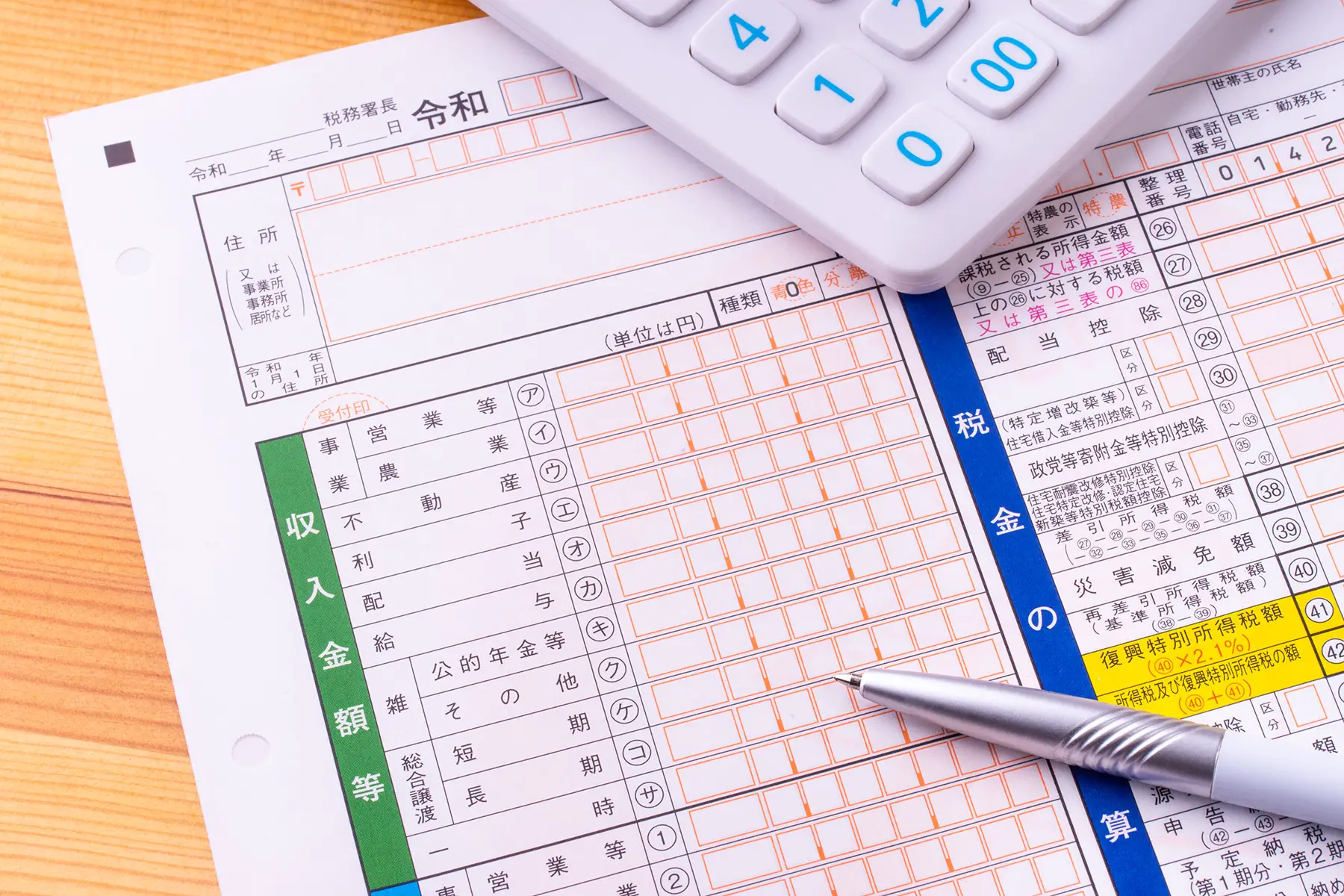If you’re living and working in Japan, you’ll likely need to pay income tax. Calculating your tax (税金) burden can be complicated, especially since the Japanese tax system (所得税制度) is so complex.
To help you get started, here’s a brief overview of the topic:
- Income tax in Japan: overview and latest developments
- Tax rates: how much tax will I pay in 2025?
- Who pays income tax in Japan?
- Deadlines to file and pay a tax return in Japan
- How do you file your tax return in Japan?
- Income tax refunds
- What if I don’t do or pay my taxes on time or at all?
- Income tax advice in Japan
- Useful resources
H&R Block
Filing U.S. taxes from Japan? H&R Block’s expat tax experts simplify the process with easy online registration and remote filing. Whether it’s answering tricky tax questions or managing paperwork, they’ve got you covered. Stay compliant, stress-free, and up-to-date – contact H&R Block today.
Income tax in Japan: overview and latest developments
Income tax (所得税) is a mandatory levy that people and businesses have to pay on their worldwide earnings of the previous year (1 January to 31 December). In Japan, this is charged at the national, prefectural (regional), and municipal levels.
Tax revenue pays for a range of government activities and public services, such as education, public transport, and defense. The Ministry of Finance’s annual report details a breakdown of expenditures (2024).

In Japan, taxable income includes:
- Your salary and other income from (self)employment, including in-kind benefits (e.g., private medical insurance or company car use)
- State benefits and pensions
- Business profits
- Interest on savings and investments
- Rental income (if you rent out a home)
- Occasional income (e.g., lump-sum payments, life insurance maturities, or prize winnings)
In addition to this, employees pay social security (社会保障) contributions to cover state benefits, pensions, public health insurance (公的医療保険), and social care.
Most Japanese employers and pension providers withhold income tax from your gross monthly income, meaning you won’t face a hefty tax bill at the end of the year. However, if you have earnings from another source or you are a sole proprietor, you must make other concessions.
The National Tax Agency (国税庁) oversees the Japanese tax system. This is part of the Ministry of Finance (MoF – 財務省).
Latest news about income tax in Japan (2025)
Every year, the MoF announces any planned changes to the tax system in the National Budget. In December 2024, it published its 2025 tax reform proposals, which included:
- Increasing the standard income tax exemption from ¥480,000 to ¥580,000.
- Increasing the minimum guaranteed deduction for employment income from ¥550,000 to ¥650,000.
- Introduce a new ¥630,000 tax exemption for parents with dependents aged 19 to 22. If the dependent earns more than ¥1.5 million a year, the exemption will decrease.
You can find more information on local and federal taxes in our article on the Japanese tax system.
Tax rates: how much tax will I pay in 2025?
Japan divides taxable income into seven tax brackets, and you will pay proportionately more tax as your income increases. The national income tax rates are as follows:
| Income | Rate | Deduction |
| Up to ¥1,95 million | 5% | – |
| ¥1,95–3,3 million | 10% | ¥97,500 |
| ¥3,3–6,95 million | 20% | ¥427,500 |
| ¥6.95–9 million | 23% | ¥636,000 |
| ¥9–18 million | 33% | ¥1,536,000 |
| ¥18–40 million | 40% | ¥2,796,000 |
| ¥40 million or more | 45% | ¥4,796,000 |
Until 2037, Japanese households also pay a 2.1% surcharge on their national income tax bill. This is a special ‘solidarity’ tax to fund the reconstruction of areas hit by the March 2011 earthquake and tsunami.

In addition to the national income tax, all residents are liable for individual inhabitant tax (or resident tax – 住民税). This is split between a 6% municipal tax (市民税) and a 4% prefectural tax (県民税), totaling 10% of their income.
Self-employed workers and corporations do not pay jūminzei; instead, those earnings are subject to enterprise tax. This ranges from 3.5–7% depending on the location and business income.
You can use one of many online tax calculators to determine how much tax you are likely to pay in Japan.
Who pays income tax in Japan?
Everyone living and earning an income in Japan needs to pay income tax. The exact rules for income tax vary depending on your residency status.
Taxpayers are split into three categories:
- Non-residents (非居住者) – expats living in Japan for less than a year without a primary Japanese residence are only liable for income tax on income earned in Japan
- Non-permanent residents (非永住者) – internationals who have had a residence in Japan for at least a year but who don’t qualify as permanent residents must pay tax on earnings from Japan and foreign income paid in or sent to Japan
- Permanent residents (永住者) – residents who have lived in Japan for at least five years or have official permanent residence status are subject to Japanese income tax on their worldwide income
The most significant difference is that non-residents pay income tax at a flat rate (rather than a progressive rate), and they’re not eligible for any deductions. More on this below.
Who needs to file a tax return?
Technically, all residents in Japan must submit a tax return (確定申告), including salaried workers, self-employed workers, sole-proprietors, and corporations. However, some exceptions apply.

For most employees and pensioners, their income tax will already be withheld from their gross monthly income. As such, they don’t need to file a final tax form. You will need to submit a tax return when you:
- Have not had your tax withheld
- Are a freelancer or a self-employed person who earns more than ¥580,000 per year
- Are an employee who earns more than ¥20 million a year
- Are a retiree whose state pension exceeds ¥4 million per year
- Have a side income of more than ¥200,000 in a year
- Have more than one employer
- Have a foreign employer in Japan or receive a salary from abroad
- Are a director of a family company or a relative of the director and receive payments such as:
- Interest on loans
- Rent for a store, office, or factory
- Charges for the use of machines and tools
- You leave Japan before the end of the tax year
You must also file a return when the amount of tax calculated is greater than the amount of your credit for dividends.
Regardless of who must or mustn’t, it’s recommended that you always double-check your tax form. You may be able to declare extra deductibles, which can lower your tax bill.
Japanese income tax for foreigners
The tax rates for expat residents are the same as for Japanese nationals. However, non-resident foreigners pay a flat rate of 20.42% and cannot apply tax deductions.
If you receive a foreign pension, it may be subject to Japanese law, depending on your residency status. The rules for non-permanent residents with a non-Japanese retirement can be complicated and may require you to file a tax return. You should consider seeking expert advice for your specific situation.

In addition, Japan has treaties with more than 50 countries to prevent double taxation, including:
- Austria
- Belgium
- France
- Germany
- Italy
- Luxembourg
- The Netherlands
- Spain
- Switzerland
- United Kingdom (UK)
You can view the full list of countries with double taxation treaties on the MoF website.
Filing US taxes from Japan
Every US citizen and Green Card holder must file a tax return with the IRS, even those living abroad. Many US expats are unaware of this obligation, assuming that, as expats, they don’t need to file or pay taxes in the US. The good news is that as long as you’re paying taxes in another country, you usually don’t owe anything to the IRS, but it’s essential to make sure, and the law says you still have to file.
Learn how to file your US tax returns from Japan by reading our article on taxes for American expats. Alternatively, you can seek advice from a company that offers a specialized tax filing service for expats, such as H&R Block.
Who is exempt from paying income tax in Japan?
Residents who earn less than ¥25 million are allowed a basic exemption when filing their tax return. The rates are as follows:
| Income | Exemption |
| Up to ¥24 million | ¥580,000 |
| ¥24m to ¥24.5m | ¥320,000 |
| ¥24.5m to ¥25m | ¥160,000 |
Deadlines to file and pay a tax return in Japan
Japan’s tax year runs from 1 January to 31 December. Tax returns, for both residents and non-residents, are due between 16 February and 15 March. If March 15 falls on a weekend or national holiday, it will be extended to the following business day.

Payments are due by the return deadline. If you file an income tax return every year, you’ll need to make prepayments in July and November. These are calculated based on the previous year’s income.
In practice, this means you’ll have already paid most of your tax by the time the deadline comes around. If you’ve just moved to Japan, you won’t make prepayments in the first year, as there’ll be no income on which to base the calculations.
The individual inhabitant tax is usually levied in June, August, October, and January. As a practical example, if you filed your tax return for 2024 in March 2025, you’ll make 2024 contributions in June, August, and October 2025, and then January 2026.
Your municipal tax authority will most likely send you a collective Tax Notice (納税通知書) or Tax Payment Slip (納付書) for the total resident tax due. Some, however, will have made agreements with employers to withhold the jūminzei from your monthly salary.
To find out more, you can visit the website of your local tax office.
How do you file your tax return in Japan?
Residents can submit their tax forms most conveniently online through the government’s e-Tax system (website in Japanese). However, you can also file a paper return by mail or in person at your local tax office (税務署). The latter also offers assistance in filling out the forms if you do not speak Japanese.
If you prefer to file your Japanese tax return on paper, you will need either one of two forms:
- Form A (確定申告書A) – for those who only have income from employment, pensions, and dividends to declare
- Form B (確定申告書B) – for residents who have different declarations to make (e.g., capital gains from real estate)
The NTA website provides a slightly outdated guide with instructions on how to file your return in various foreign languages, such as English, Chinese, and Portuguese. A more updated guide and one with step-by-step instructions are only available in English.

Unlike in some other countries, Japanese tax returns can only be filed individually – there are no joint returns for couples.
How to register for tax in Japan?
Like most official services, your tax return is linked to the Individual Number (My Number – マイナンバー). You will automatically be assigned this 12-digit ID number within two or three weeks of registering your Japanese address.
Similarly, when setting up a business in Japan, you’ll be allocated a corporate number (法人番号) by the NTA. This 13-digit number works as a standard identifier for every company in the country and is used for tax purposes as well.
Deductibles and tax credits
Japan offers plenty of ways to save on your income tax bill. For example, the employment deduction (所得控除) is a standard ‘earned income’ deduction that all workers may apply. This ranges from ¥650,000 to ¥1.95 million, depending on your earnings.

Other allowances and deductibles in Japan include:
- Mortgage interest – interest is not deductible, but a mortgage credit may be available for up to 10 years if you meet specific conditions. If your property qualifies for the deduction, you can offset 1% of your remaining mortgage per year against your tax bill.
- Medical expenses – medical costs are deductible, albeit with some limitations
- Social security and insurance premiums – this includes premiums for national health insurance, private health insurance, social medical insurance for the old-aged, national and employee pension insurance, and long-term care insurance
- Life insurance premiums –includes life insurance policies, long-term medical care insurance, and individual annuity insurance
- Widows and single parents exemptions – widows and single parents can claim a fixed allowance against their tax return. In 2023, the widow allowance was ¥270,000, and the single-parent allowance was ¥350,000.
- Working student allowance – this is set at ¥270,000 for working students earning up to ¥750,000
- Disability allowances – this allowance is available for people living with disabilities or their caretakers, ranging from ¥270,000 to ¥400,000
- Charitable contributions – donations to organizations based in Japan may be tax deductible. The allowable deduction is 40% of the amount donated, minus ¥2,000.
Allowances for self-employed income in Japan
Self-employed workers in Japan can offset the business expenses they incurred during the year. For example, if you work from home, you can deduct a portion of your rent and utility costs.
Other allowances include:
- Travel expenses
- The cost of entertaining clients
- Material costs (such as office supplies)
- Taxes related to operating the business (such as enterprise tax)
- Insurance premiums

The amount of deductions you can reasonably offset will vary from business to business. It’s recommended you seek expert financial advice to get the maximum out of your tax bill.
How do I pay my income tax in Japan?
There are various methods you can use to pay your income tax bill. These are:
- Automatic payment by tax transfer account, which you can set up through the NTA or your local tax office
- Direct e-Tax payment if you have an online account
- Via internet banking or ATM
- Credit card
- Mobile payment from a smartphone
- Payment at convenience stores using a payment slip with a QR code
- Over-the-counter payment at a financial institution (bank, post office, etc.) or local tax office
In Japan, income tax is paid tax in three installments. Prepayments are made in July and November of the current tax year, with the final installment due by 15 March the following year.
The third installment for tax transfer accounts is slightly later, in mid-April (the date for the final 2025 payment will be 23 April 2026).
If you have paid at least half of your due tax, you can also choose to postpone your final installment until 31 May. This postponed payment is subject to an annual interest rate of 7.3%.
Income tax refunds
If you believe you’re eligible for a tax refund (還付), you must fill in the “where to receive your refund” section on the first page of your tax return. The refunded sum will be transferred to your specified bank account, though it needs to be an account in your name.

If you don’t submit a tax return, you can still apply for a refund. This could be the case, for example, if you have certain allowable deductions that weren’t considered when calculating the amounts withheld from your salary.
The NTA should sort this out for you automatically. However, if they don’t, you can also complete a tax return form containing details of your refund.
If you feel that the Japanese tax authorities have charged you too much and you wish to appeal, you can do so through the NTA appeals system.
What if I don’t do or pay my taxes on time or at all?
If you fail to file your taxes on time or deliberately withhold information about your earnings, you may face a fine and/or other punishments. For example, while currently only a government proposal, Japan plans to evict foreign permanent residents who fail to pay their taxes and social insurance contributions.
Depending on your (in)action, tax fines and penalties include:
- Fines for late income tax returns are 15% of the amount owed, rising to 20% for amounts over ¥500,000
- Failing to file a CT return can amount to 15% of the tax owed, plus an additional 5% on any sum exceeding ¥500,000
- Deliberately withholding information can lead to a fine of at least 35–40%. You face a further 10% on top of these rates if you were fined for the same offense in the last five years.
- Delinquent tax fees for late payments can amount to 7.3–14.6% per year, plus interest
You should contact the NTA as soon as possible if you think you may have difficulties paying tax or submitting your tax return on time.
Income tax advice in Japan
If you’re new to taxes in Japan or have a complicated tax situation, you should consult your own financial advisor with any specific tax issues or questions.
Japan has a number of expat-friendly tax experts who offer help and information in English, Chinese, or other languages, including:
When hiring a financial advisor, make sure they meet the standards set by the Accounting Standards Board of Japan (企業会計基準委員会). This is overseen by the Japanese Financial Services Agency.
Useful resources
- National Tax Agency – official information on the Japanese tax system and rules in English
- PWC Tax Summaries – website with official income tax rates in Japan





